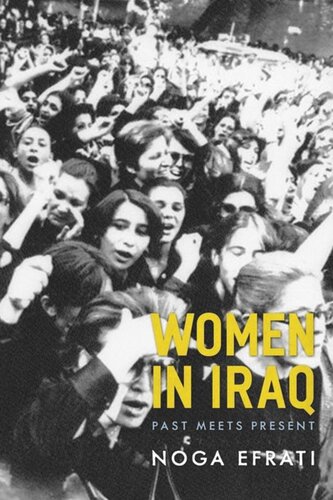

Most ebook files are in PDF format, so you can easily read them using various software such as Foxit Reader or directly on the Google Chrome browser.
Some ebook files are released by publishers in other formats such as .awz, .mobi, .epub, .fb2, etc. You may need to install specific software to read these formats on mobile/PC, such as Calibre.
Please read the tutorial at this link: https://ebookbell.com/faq
We offer FREE conversion to the popular formats you request; however, this may take some time. Therefore, right after payment, please email us, and we will try to provide the service as quickly as possible.
For some exceptional file formats or broken links (if any), please refrain from opening any disputes. Instead, email us first, and we will try to assist within a maximum of 6 hours.
EbookBell Team

0.0
0 reviewsNoga Efrati outlines the first social and political history of women in Iraq during the periods of British occupation and the British-backed Hashimite monarchy (1917–1958). She traces the harsh and long-lasting implications of British state building on Iraqi women, particularly their legal and political enshrinement as second-class citizens, and the struggle by women's rights activists to counter this precedent. Efrati concludes with a discussion of post-Saddam Iraq and the women's associations now claiming their place in government. Finding common threads between these two generations of women, Efrati underscores the organic roots of the current fight for gender equality shaped by a memory of oppression under the monarchy.
Efrati revisits the British strategy of efficient rule, largely adopted by the Iraqi government they erected and the consequent gender policy that emerged. The attempt to control Iraq through "authentic leaders"—giving them legal and political powers—marginalized the interests of women and virtually sacrificed their well-being altogether. Iraqi women refused to resign themselves to this fate. From the state's early days, they drew attention to the biases of the Tribal Criminal and Civil Disputes Regulation (TCCDR) and the absence of state intervention in matters of personal status and resisted women's disenfranchisement. Following the coup of 1958, their criticism helped precipitate the dissolution of the TCCDR and the ratification of the Personal Status Law. A new government gender discourse shaped by these past battles arose, yet the U.S.-led invasion of 2003, rather than helping cement women's rights into law, reinstated the British approach. Pressured to secure order and reestablish a pro-Western Iraq, the Americans increasingly turned to the country's "authentic leaders" to maintain control while continuing to marginalize women. Efrati considers Iraqi women's efforts to preserve the progress they have made, utterly defeating the notion that they have been passive witnesses to history.